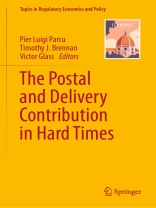This book includes original essays by prominent researchers and practitioners in the field of postal and delivery economics, originally presented at the 29th Conference on Postal and Delivery Economics held online, September 1-3, 2021. The central focus of the book is the short and long-term impact of covid-19 pandemic on the sectors, both from the economic and regulatory perspectives. Other important topics include the unstoppable growth of e-commerce and the implications for delivery market; solutions for the “last mile”, and the associated challenges in terms of sustainability. Chapters also discuss traditional topics for postal and delivery sectors, such as the competitive dynamics in the sector, the business strategies of postal operators, as well as the definition and funding of the Universal Service Obligation. This book will be a useful tool not only for graduate students and professors interested in postal and regulatory economics, but also for postal administrations, consulting firms, and federal government departments.
Cuprins
The rise of e-commerce platforms in the parcel delivery markets.- Parcel locker stations: The future of e-commerce delivery?.- Regulation: Quo Vadis? Revisited..- “Is Postal Service a Natural Monopoly?”:A 30-year retrospective on Panzar’s seminal paper’.- The first tests of the SGEI Framework in the postal sector: takeaways from the judgements in the Česká pošta and Post Danmark cases.- Universal service vs. targeted measures towards vulnerable people: how to address postal users’ needs?.- Retention ratios in retail networks and their application to post offices.- Access regimes in the European postal markets.- The Economic Implications of “Density-Based Rate Authority”.- E-commerce, parcel delivery and environmental policy.- Assessing efficiencies and benefits of “sustainability agreements” in the postal sector.- The effects of the Covid-19 crisis on postal markets.- Short and longer-term impacts of the Covid-19 pandemic on postal consumer demands, Universal Service Providersand the wider postal sector.- Covid-19 and Swiss Post: Volume developments and the economic value of postal service, in the pandemic and beyond.- A global survey of COVID-19 postal regulatory responses, to appraise short and long-term impacts.- The impact of the COVID-19 pandemic on the postal market: Challenges and opportunities for the postal regulatory framework.- Digital exclusion and the role of Posts have to play to fight against it.- The Response to Extensions of Vote-by-Mail and Early In-person Voting in the 2020 U.S. General Election.- Cost allocation and cooperative game theory.- Demand elasticities for publishing mail traffic in the UK: Intensive and extensive margins.- The Temporal and Spatial Dynamics of the USPS’ Service Performance Scores over the Period 2011-2020.
Despre autor
Pier Luigi Parcu is part-time Professor at the European University Institute (Italy) and Area Director of the Florence School of Regulation Communications & Media. He is Director of the Centre for Media Pluralism and Media Freedom and Director of the Florence Competition Program in Law and Economics. His research in the area of industrial organization and law and economics focuses on the interaction between regulation and antitrust in shaping firms’ behavior.
Timothy J. Brennan is professor of public policy and economics at University of Maryland, Baltimore County (US). He has published over 135 articles and book chapters, principally on antitrust and regulatory economics, including the electricity, telecommunications, postal, oil pipeline, and other infrastructure sectors. He also has a strong interest in the nexus between economics and philosophy, which he has applied to questions such as the ethics of discount rates and the role of consumer error in designing energy policy.
Victor Glass is a professor of professional practice in the finance and economics department at Rutgers Business School (US). He is the director of the Center for Research in Regulated Industries. For almost thirty years, he was responsible for forecasting demand and setting access rates for more than 1, 100 telephone companies and was heavily involved in regulatory reform. He has published studies of market and regulatory issues that have appeared in academic journals and trade magazines.












